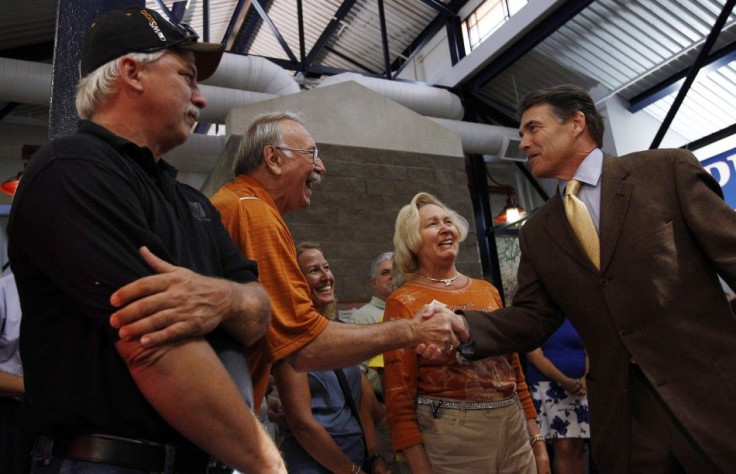Rick Perry to Seek Small, Activist Donors

Rick Perry's ties to well-heeled Texans will help raise cash for his presidential run but he will also be gunning for passionate anti-Washington Republicans whose small donations have fueled rival Michele Bachmann.
Perry excels at courting mega-donors in Texas, helping him win three terms as governor. Perry will now look to broaden his financial base to Republicans often associated with the fiscally conservative Tea Party movement, fundraisers and analysts said.
Small donors are critical because they are very frequently activists, said Greg Slayton, a Perry fundraiser who said small donors would be an important part of the candidate's money-raising effort. If they go out and fire up their friends at the PTA (Parent-Teacher Association) or the bowling league, that is invaluable.
Since Perry's late entry to the Republican race last weekend, the field of top-tier candidates has narrowed to him, Bachmann and front-runner Mitt Romney in the contest to take on President Barack Obama in 2012.
An average of national polls puts Perry a close second to Romney, with Bachmann about 10 percentage points behind, according to realclearpolitics.com.
Bachmann won the Iowa straw poll last weekend -- an early test of strength in the Republican race -- where both Romney and Perry did not seriously compete.
Perry and Minnesota congresswoman Bachmann are both popular with backers of the Tea Party, which supports lower taxes and limited government.
Bachmann's fundraising success has been built upon small donors giving several times over. Two thirds of her recent donations came in increments of $200 or less, according to the Campaign Finance Institute.
I see Perry using a similar approach to erode Bachmann's base of support, said Eric Ostermeier, a University of Minnesota researcher who writes a widely read blog on Minnesota politicians.
Romney lured only 6 percent of donors in that category and does not appear to be making efforts to appeal to them.
DUAL STRATEGY
Romney, a former Massachusetts governor who is seen as the candidate of the Republican establishment, leads in the money race, hauling in about $18 million in the second quarter, several times his rivals.
Bachmann is a formidable fundraiser herself, raising more cash than any U.S. House of Representative candidate in the last election cycle. Still, she trails behind Romney, reporting $4 million in the second quarter.
The eventual winner needs a warchest to compete with Democrat Obama, who raised a record $745 million during the 2008 election and who some say could pull in $1 billion this time.
Perry raised $39 million in his last race for governor, according to Texans for Public Justice, a watchdog group. Nearly half of that cash came from mega-donors giving $100,000 or more.
Texas has no dollar limit on donations to political candidates, whereas on the federal level individuals can only give $2,500 per primary and general election.
A small fraction of individual donations to Perry over the past decade came in small amounts, so he will be embarking in new territory to undercut Bachmann.
He really has to do both. Small dollar donors build enthusiasm and numbers. Large dollar donors will help him stay in the game, said Jerry Kilgore, a former fundraiser for former President George W. Bush.
Perry will not and cannot not ignore the wealthy and big business. But with the race developing more slowly than the last election, there are still millions of dollars sitting on the sidelines.
His Texas ties will serve him well.
There is literally almost an infinite reservoir of campaign cash out of Texas -- he couldn't come from a better place to raise money quickly, said Larry Sabato, a political science professor at the University of Virginia.
© Copyright Thomson Reuters 2024. All rights reserved.











